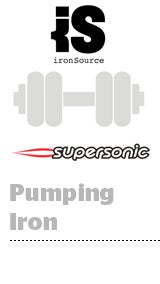 Developers are up to their ears in mobile SDKs – and they’re not going to take it anymore.
Developers are up to their ears in mobile SDKs – and they’re not going to take it anymore.
The trend toward consolidated mobile solutions is real, said Omer Kaplan, deputy CEO and co-founder of app discovery platform ironSource, which has acquired mobile monetization platform Supersonic.
The deal was officially announced Thursday following a leak in mid-July when several Israeli publications reported whisperings of an ironSource/Supersonic union.
It’s a move away from “the disarray of SDKs and platform integrations” that the mobile ad market has become, said Supersonic CEO and co-founder Gil Shoham.
Although Kaplan declined to share the sale price, he did note that the two companies have collectively generated about $450 million in revenue thus far in 2015. They have a combined reach of 1 billion monthly users.
IronSource recently completed two rounds of venture funding – $85 million in September 2014 followed by $20 million five months later. The two events represented the first time ironSource had pursued funding since the company, which is on the verge of preparing for an IPO, was founded in 2010.
At the time of its second cash infusion in February, ironSource CEO Tomer Bar-Zeev told AdExchanger, “We’re going to be very, very active on the acquisition front.”
The driver of the Supersonic deal was the company’s desire to be a “full-stack solution” for its developer clients, Kaplan said. In other words, developers need distribution and user acquisition. They also need to monetize. Both are core requirements for survival, so the logic was why not make that functionality available from a single access point?
“More and more, developers are looking for fewer partners, independent partners that can still give them scale,” Kaplan said. “Even a year ago, getting a partner to integrate a new SDK was significantly easier than getting a partner to do that today. Most big partners are limiting the number of companies they work with in favor of a full-scale solution.”
When someone invokes the word “independent,” the next logical thought is likely of what isn’t independent – the Facebook, Google, Apple crowd.
“While they’re all naturally a very important part of the ecosystem, these guys actually are the ecosystem,” Kaplan said. “And while that’s not necessarily a negative thing, in fact it has advantages, many developers are looking for an alternative which they consider more objective or that they’re more comfortable sharing data with.”
AdExchanger Daily
Get our editors’ roundup delivered to your inbox every weekday.
Daily Roundup
The near-term vision is to combine the ironSource and Supersonic SDKs into one product. Bringing the two SDKs together into a single offering is a top priority and “won’t take too long,” Kaplan said, although he wasn’t able to share an exact timeline for integration.
The unified SDK will give clients access to a federated product with which to analyze user behavior, run acquisition efforts, monetize existing users – rewarded video is one of Supersonic’s core offerings – and optimize campaigns.
“The market is getting way smarter,” Kaplan said. “Whereas developers weren’t as educated about ROI and post-install and optimization before, now everything revolves around understanding exactly who the right users are and measuring the entire funnel.”
For Supersonic client Rovio, the Finnish game studio responsible for Angry Birds, the merger makes sense. The deal “will surely create one of the most formidable concentrations of talent and technology” in the mobile ad space,” said Eric Seufert, VP of user acquisition at Rovio.
IronSource, whose client list includes Yahoo, Google, Baidu and GREE, has around 550 employees spread across offices in San Francisco, New York, Beijing and its headquarters in Tel Aviv. Supersonic’s 250 employees will swell the combined company’s headcount to more than 800, roughly half of whom are engineers focused on R&D.
Supersonic maintains its HQ in San Francisco, with additional offices in Tel Aviv, Los Angeles, New York, London and Beijing. The company had raised $23.2 million in three rounds since it was founded in 2009. In addition to Rovio, Supersonic’s clients include Hyundai, Unilever, Disney, Machine Zone and Nextplus.













